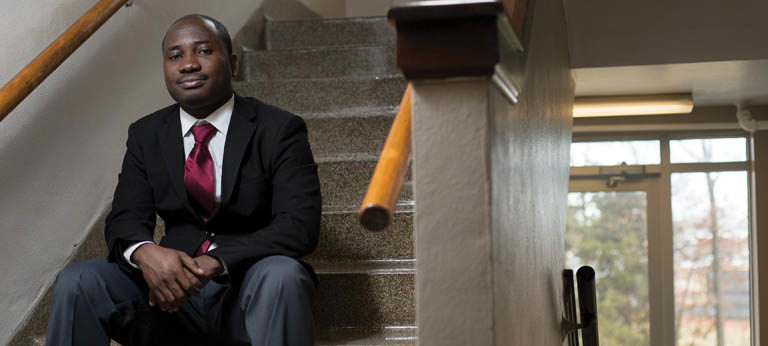Safer mines and cleaner water in Ghana
Posted by magazine

Kenneth Bansah, geological engineering doctoral student who has formed a nonprofit organization in his native Ghana to improve working conditions for female artisanal miners who do so as means to survival. Sam O’Keefe/Missouri S&T
As a doctoral student in mining engineering, Kenneth Bansah works, learns and lives nearly 10,000 miles from his boyhood home of Tarkwa, Ghana, a gold mining hub in western Africa.
But even as he fine-tunes his dissertation on mitigating sinkhole hazards and other karst formations — and takes care of three children ages 4 and under while his wife completes her own graduate studies in Michigan — the subsistence gold miners of Ghana are never far from Bansah’s mind.
Or his heart.
It’s known as “galamsey,” illegal mining by untrained workers who routinely brave dangerous conditions and toxic exposure to feed their families. In some cases they use picks and shovels to sift through the leftovers ignored by industrialized mining operations. The term is derived from the English phrase, “gather them and sell.”
The World Bank estimates that more than 20 million people globally living in the “poorest and most remote rural areas, with few employment alternatives” practice what’s also known as small-scale or artisanal mining.
In Ghana, such mining (both legal and illegal) accounts for nearly one third of gold production in a nation that before gaining its independence 60 years ago was known as the Gold Coast. Diamonds are also mined in Ghana, although on a much smaller scale.
Government regulations enacted in the late 1980s to monitor artisanal mining have failed to keep pace with the growth of the market. An example of that is the arrest and expulsion of thousands of illegal Chinese miners in 2013. Armed with crude excavators and pumps, the modern-day gold rushers left behind pockmarked forests, abandoned mines susceptible to collapse, and rivers contaminated by the mercury used to extract gold.
The artisanal miners who remain often engage in those same harmful practices, albeit on a smaller scale, says Bansah. Many are women whose children are also forced by economic necessity to work. Pulled from school at an early age, the children usually remain trapped in the cycle of poverty, he explains.
“I was fortunate,” says Bansah, a police officer’s son who taught at the University of Mines and Technology in his home country after earning an advanced degree there. “But there are many people in my country who have no source of income other than subsistence farming. They can’t take care of their children. So they look at mining as a means of survival.”
In 2016, Bansah enlisted several colleagues, including former students, to create the nonprofit group Mining & Community Research. Its goal: using scientific rigor and technical expertise to promote sustainable development.
Over the recent winter break, he returned to Ghana to work on three projects: a series of “Getting Children Out of Galamsey” community workshops; skills training for female artisanal miners; and an infrastructure improvement effort to raise money for a village’s new clean water drinking system.
“Often times, we do a lot of research that is not directly affecting the lives of the people we do the research about,” Bansah says. “You spend a whole lot of money doing research, and the reports gather dust on a shelf.”
Neil Anderson, Bansah’s thesis advisor, describes him as an “exceptionally mature” scholar whose dedication to improving his homeland is uncommon among the ranks of more singularly focused graduate students.
“Very few students are broad-based enough to look around and understand there are other important issues (beyond their dissertation),” says Anderson, a professor of geological engineering.